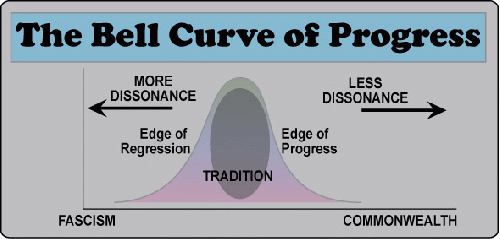The Choice: Fascism or Commonwealth
Economic history reveals a constant battle between commonwealth and fascism. Under commonwealth, people are happy and productive. Under fascism, people are stressed and destructive. Much of human history lays in the grey area between these two extremes. Our challenge is to recognize in which direction we are heading and choosing where to lead others.
The difference between fascism and commonwealth is sometimes claimed to be a choice between good and evil, but the choice is not about 'them.' It is our own level of self-awareness that determines what we choose. The 'evil' are sure of their choices, and believe them to be well reasoned, even at the extremes of fascism. There was an entire body of science that the Nazis created to 'prove' to themselves the superiority of Aryans, and they had similar evidence that proved a world-wide Jewish conspiracy that needed to be stopped. People can convince themselves of anything, no matter how ridiculous. Similar bodies of work self-certify the superiority of monarchy, religion, democracy, capitalism, islamism and socialism. If any of these systems worked as claimed, there would be no point to writing or reading this book.
Unfortunately, wisdom can only be discovered by the testing of ones own beliefs. Claiming others to be inferior is a bit too easy. We need to untangle our own contradictions. Under such circumstances, a little humility will go a long way.
A society shifts the status quo toward commonwealth by refining its values, removing prejudices and thinking consistently across the religious, political and economic realms. Man is his own worst enemy, and dissonance is 'the enemy within' that leads to fascism. The pairing of contradictory ideas has no limits. Money plays a key role because it is the common tool through which we all interact. Ownership and rights stretch across generations, but there can be no rights without an equal share of responsibility to the collective that grants and protects those rights. Commonwealth is not a concept of shared ownership, but one of a shared existence.
Tragically, the math we commonly use when handling money exhibits its own dissonance. Previous chapters dealt with the nature of these mathematical contradictions, by removing them we can lay the foundations for commonwealth and build a peaceful and prosperous society.
The Problem: Inflation and Debt and Inequality
Let's be clear on where the problem lies: inflation, debt and inequality are the problems that we must eliminate. Individuals, government, businesses and non-profits must all change how they handle money. This is an accounting methodology problem as much as anything else. We are all feeding a vicious cycle of "percentages added" that can only lead to more inflation. Taxes, Profit and Interest are all the same thing mathematically. It will take everyone to change the direction of society, but reform always begins at the bottom, with one person with a new idea. It takes time for ideas to spread, and individuals to take action to guide others.
What is missing is a Universal Code of Conduct for how money should be handled. This is both a moral and a mathematical imperative. A machine must be engineered using standards of predictability. Consistency is the basis of trust, and without trust and standards, a society cannot function. Freedom is a group effort, ironically. Obedience to law is only half of the equation of a free society. The other half is good laws, and they have been in short supply for many generations.
Because we are divided by age, wealth, position, skill and realm, a reform strategy must begin in many places simultaneously. Change can be thought of as a giant migration. As ideas spread, individuals will slowly change direction forcing the stampede to alter course slightly. This process will continuously repeat until eventually the stampede has completely changed direction. As Thomas Paine wrote at the opening of Commonsense, 'Time makes more converts than reason.' We all constitute a pressure point that can enable change. By having the courage to begin, success is assured, but in which direction is the bell curve moving?
Reforms for the Individual
A virtuous society requires virtuous people. There is no way around this fundamental, and our personal finances must illuminate virtue before our laws and institutions can reflect them. The most common dissonance of the large middle-class is paying interest with one hand while trying to collect it with the other. Long-term loans are taken for education, cars, housing and short-term loans exist on credit cards. Meanwhile, long-term planning for retirement is based on saving and accruing compound interest and investing in stocks.
Our banality with this contradiction is the root cause of why we were attacked on 9/11. Thousands of lives have been lost, trillions of dollars spent, and a gigantic surveillance state has been erected because of this habit. A similarly sized apparatus exists attempting to audit the fraud possibilities inherent in this type of banking, too. We waste a lot of resources perpetuating a complicated system, when a simple system could serve everyone well.
The sufferings of society are caused by quiet money decisions made in private, which is where most of the burden is carried, too. A huge legal and institutional structure must be maintained to allow for debt and profit from debt to exist. This is a centuries old problem, and we can see the results in the compounding of inflation and frequent wars, which represent the collapse of trade, freedom and liberty. We must be part of the change that we have been waiting upon. Our checkbooks are more powerful than the ballot box, contracts or peace treaties. We create a social environment by how we trade with one another. Gangsta and gangs, organized crime, country club jealousies, it is all part of the same continuum of innocence lost.
(Note: You can view every article as one long page if you sign up as an Advocate Member, or higher).






